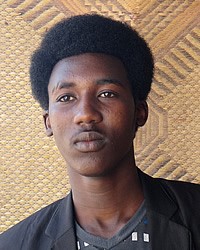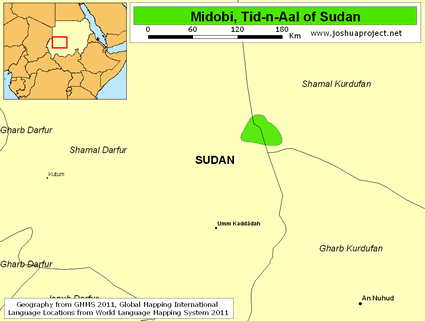The Midob, also known as the Tiddi, are primarily concentrated in the Meidob Hills of western Sudan. They have three subgroups. A large number of Midob also live in the town of Malha. Nearby, on the outskirts of the Meidob Hills, live the Berti farmers and the Beri and Arab shepherds. Mutual hostility exists among all of these groups. The Midob are an independent people and have the reputation of being untrustworthy animal thieves. As a result, other peoples avoid settling near them.
The Midob language, also called Midob, can be traced to the language of the Nubians, a people from Eastern Sudan. With regard to their traditions and their culture, the Midob also are linked to various Nubian groups such as the Mahas and the Dongolawi. These are completely Muslim peoples. Traces of Islam have existed in Midob history from as early as the seventeenth century; but the Midob only fully converted to Islam in the nineteenth century.
The Midob are semi-nomadic shepherds who rely on the acquisition of livestock for their livelihood. They mainly raise sheep and goats, but also keep some donkeys, camels and cattle. Young adult men and adolescents tend to the sheep and camels. These animals are raised separately from other livestock because they must be moved continuously from pasture to pasture. Women tend to the goats, cattle, and donkeys, which are kept in the settlements within easy reach of water supplies. The Midob also are farmers, growing sorghum, millet and vegetables.
The Sudan area has experienced drought and war for decades, with no sign of it letting up. Consequently, more and more young Midob men have migrated to cities in search of work. A number of Midob have become successful businessmen, re-investing their wealth in herd expansion.
Midob villages are located at the foot of the hills. Each family lives in a settlement which consists of a small number of separate huts. These huts are dome-shaped and are constructed of poles, branches and grass. Each adult woman has her own hut and lives with her children; her husband also lives there when he is not off tending the livestock. In each village is a headman who handles village disputes and directs village affairs. Many villages also have a mosque where the men meet daily for prayer.
Midob men usually have more than one wife. Polygyny exists to fulfill the Islamic rule that one should produce many children. Also, a large family provides the help needed at home during the husband's absence when he is caring for the livestock. After marriage, a couple will move to live with either the husband's or wife's family, depending on the needs of the family. Residence therefore is determined not by descent, but by kinship needs.
The Midob are a completely Muslim people, devout in their practice of Islam. The men observe all of the main Muslim festivals. The women, however, have had less contact with outside influences; consequently, they still carry out many traditional pre-Islamic practices such as fertility rites and divination (contact with the spirit world).
The Midob are virtually all Muslim. The vast majority have never had an opportunity to hear the gospel. They are a spiritually isolated people who desperately deserve a chance to know of a Savior. Evangelism, Christian resources, and much prayer are needed to help bring Jesus Christ into their lives.
Pray for Midob family leaders to have dreams of the loving and powerful Christ, opening them to his ways.
Ask the Lord of the harvest to send loving and dedicated laborers to the Midob.
Pray that God will give the people a hunger to know Jesus and a desire to disciple others in his ways.
Pray that Christian radio broadcasts will fill western Sudan and reach the Midob with the gospel message.
Scripture Prayers for the Midobi, Tid-n-Aal in Sudan.
https://en.wikipedia.org/wiki/Midob_people
https://www.101lasttribes.com/tribes/midob.html
| Profile Source: Joshua Project |











